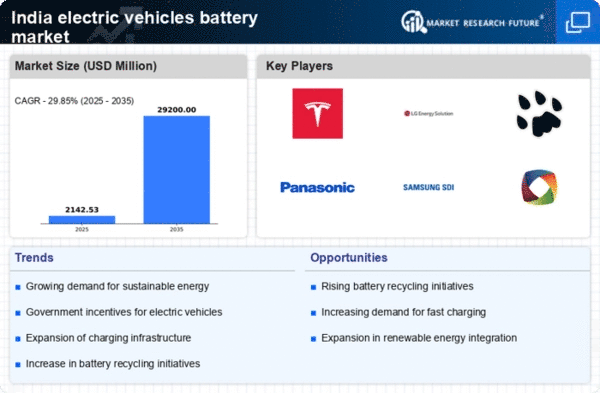Supportive Regulatory Framework
A supportive regulatory framework is emerging as a vital driver for the India electric vehicles battery market. The government has introduced several policies aimed at promoting electric mobility, including tax exemptions and subsidies for electric vehicle purchases. The Faster Adoption and Manufacturing of Electric Vehicles (FAME) scheme has allocated substantial funds to incentivize manufacturers and consumers alike. This regulatory support is expected to create a conducive environment for the growth of the India electric vehicles-battery market, as it encourages investment in battery technology and manufacturing. As regulations become more favorable, the market is likely to expand, attracting both domestic and international players.
Investment in Charging Infrastructure
Investment in charging infrastructure is a critical driver for the India electric vehicles battery market. The expansion of charging stations across urban and rural areas is essential to alleviate range anxiety among potential electric vehicle users. The government has initiated various programs to promote the establishment of charging networks, with an estimated investment of over $1 billion planned for the next few years. This infrastructure development is expected to facilitate the adoption of electric vehicles, thereby increasing the demand for batteries. As more charging points become available, the India EV battery market is likely to witness significant growth, as consumers gain confidence in the practicality of electric vehicles.
Increasing Collaborations and Partnerships
Increasing collaborations and partnerships among stakeholders are emerging as a significant driver for the electric vehicle batteries market in India. Automakers, battery manufacturers, and technology firms are joining forces to enhance battery performance and reduce costs. These collaborations are fostering innovation and accelerating the development of advanced battery technologies. For instance, partnerships between Indian companies and international firms are facilitating knowledge transfer and access to cutting-edge technologies. This collaborative approach is expected to strengthen the India electric vehicles battery market, as it enables the rapid deployment of new solutions and enhances the overall competitiveness of the industry.
Rising Demand for Sustainable Transportation
The India electric vehicles battery market is experiencing a notable surge in demand driven by the increasing consumer preference for sustainable transportation solutions. As urbanization accelerates, the need for eco-friendly alternatives to traditional vehicles becomes more pressing. The Indian government has set ambitious targets to achieve 30% electric vehicle penetration by 2030, which is likely to further stimulate market growth. Additionally, the growing awareness of air pollution and its health impacts is prompting consumers to consider electric vehicles as a viable option. This shift in consumer behavior is expected to enhance the demand for electric vehicle batteries, thereby propelling the India EV Batteries Market forward.
Technological Innovations in Battery Production
Technological innovations in battery production are playing a pivotal role in shaping the electric vehicles batteries market in India. Advances in battery chemistry, such as lithium-ion and solid-state technologies, are enhancing energy density and reducing costs. The introduction of new manufacturing techniques is expected to lower production costs by up to 20%, making electric vehicles more affordable for consumers. Furthermore, research and development initiatives are focusing on improving battery lifespan and charging speed, which are critical factors for consumer acceptance. As these innovations continue to evolve, they are likely to drive the growth of the India electric vehicles battery market, making electric vehicles a more attractive option for Indian consumers.
















